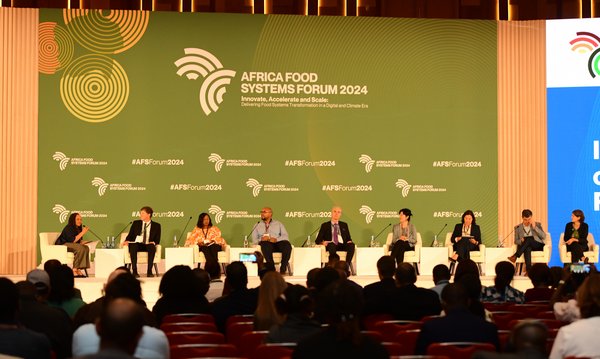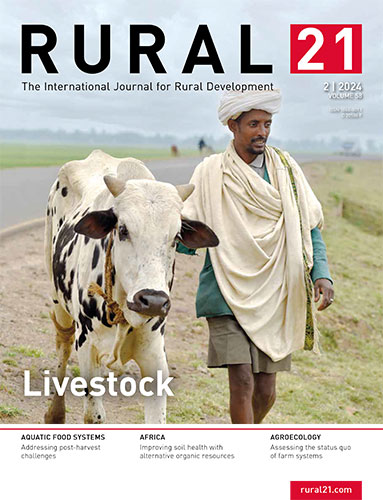- Share this article
- Subscribe to our newsletter
Paving the way for food systems transformation in Africa
More than 3,000 attendees from over 70 countries met at the Africa Food Systems Forum 2024, which took place in Kigali/Rwanda from the 2nd–6th September 2024 under the topic Innovate, Accelerate and Scale: Delivering food systems transformation in a digital and climate era.
Diverse stakeholders, including world leaders, investors, academia, farmers’ organisations and the private sector shared and discussed innovations, technologies, best practices, business models, policy delivery mechanisms and investments to accelerate food systems transformation in Africa and beyond, with youth and women at the helm.
At the high-level presidential summit, UN Deputy Secretary-General Amina Mohammed highlighted Africa’s growing hunger crisis, where "around 280 million people are undernourished—an increase of 57 million since the COVID-19 pandemic”. She noted that small farmers faced annual climate-related losses of USD 670 million, adding that women farmers were disproportionately impacted. “Households headed by women in rural areas lost about 8 per cent more of their income to heat stress than male-headed households,” she said. Floods also caused "an extra USD 37 billion lost to women from heat stress and an extra USD 16 billion from floods each year”.
Empowering small and medium enterprises across the value chain
Donald Brown, Associate Vice-President of the International Fund for Agricultural Development (IFAD), addressed the immense challenges facing African food systems, including climate change and resource depletion. “The case for investment in these systems is massive and growing with time,” Brown emphasised. “This is why IFAD is doubling down on its partnerships with African leaders, farmers and the private sector to invest in transforming their food systems.”
He noted that dynamic small and medium enterprises were already operating across food value chains but highlighted the need for sustained investment to ensure that "opportunities and benefits are equitably shared – by women and men alike, by young people, by marginalised and vulnerable groups." Brown urged action, stating: “How development finance institutions, governments and the private sector invest today will determine the future of African food systems.”
There is a range of dynamic small and medium-scale enterprises operating in different segments of food value chains, often with innovative and technology-enabled business models. According to Brown, the challenge lies in how to invest in sustaining this dynamism so that it reaches all the parts of food systems where transformation is needed, and how to ensure that opportunities and benefits are equitably shared, also in remote rural areas.
“How development finance institutions, governments and the private sector invest today will determine the future of African food systems,” Brown added.
Strengthening sanitary and phytosanitary standards for safer food
At the Food Systems Forum, specialists from CABI highlighted its expertise in supporting resilient and sustainable food production as well as its efforts to promote sustainable crop health.
This included how the CABI-led PlantwisePlus programme in 2023 supported over 13 million farmers – with innovative digital decision support tools and online learning products – to grow more and lose less to crop pests and diseases such as the papaya mealybug (Paracoccus marginatus).
Furthermore, in highlighting how CABI was bringing science-based agricultural knowledge to millions of smallholder farmers – helping to increase their yields – the Pest Risk Information Service (PRISE) was showcased as a successful pest forecasting system.
Dr Gbemenou Joselin Benoit Gnonlonfin, CABI’s SPS Global Program Lead, stressed the importance of enhancing Sanitary and Phytosanitary (SPS) capacities to meet the rising demand for high-quality, safe food. “Africa’s agriculture can contribute towards the supply of sufficient and nutritious food, but regulatory frameworks must keep evolving to mitigate the risks posed by increasing trade and climate change,” he said. With Africa’s population expected to reach 2.5 billion by 2050, Gnonlonfin emphasised that strengthening food safety standards was crucial.
Ines Lechner, editor Rural 21
More information:




Add a comment
Be the First to Comment